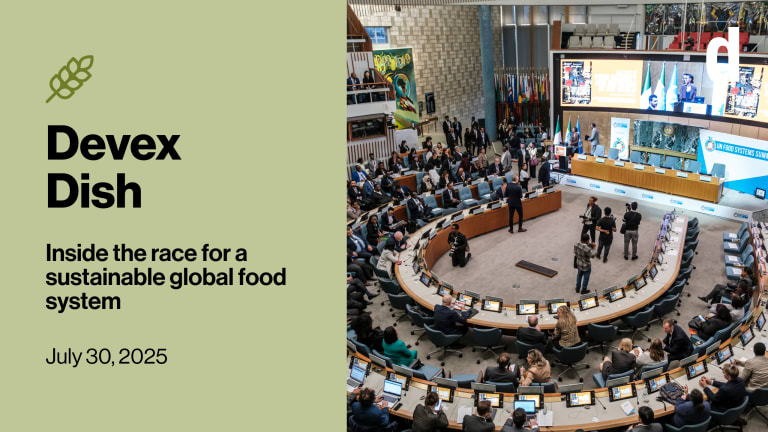
UNITED NATIONS — Climate change and inequality are threatening the unsteady progress countries are making on the Sustainable Development Goals, U.N. experts warned on Tuesday.
With the exception of a few areas, the majority of the 17 global goals remain off-track for completion by their 2030 deadline, according to the United Nations’ latest report on the SDGs.
“It is abundantly clear that a much deeper, faster, and more ambitious response is needed to unleash the social and economic transformation needed to achieve our 2030 goals.”
— António Guterres, U.N. secretary-general“The goals are very ambitious — like reaching zero hunger, eliminating poverty — and it is really challenging to reach that target in a short period of time,” Yongyi Min, chief of the Sustainable Development Goal Monitoring Section at the U.N. Department of Economic and Social Affairs, said in an interview with Devex.
“Climate change jeopardizes a lot of the progress already made if we do not take on this issue. The goals are all interlinked, climate change links to poverty, links to disaster, links to hunger, links to water scarcity, and biodiversity loss,” Min continued.
Direct economic losses from disasters from 1998 to 2017 were estimated at almost $3 trillion, with climate-related disasters accounting for 77% of the total, according to the report. Meanwhile, despite an increase of 17% in climate finance flows from 2013-2014 to 2015-2016, investment in fossil fuels continues to be higher than investment in climate activities.
The U.N. released its updated landscape of the 2030 sustainable development agenda on Tuesday, the first day of the annual High-level Political Forum on sustainable development. This year’s two-week forum is set to highlight country progress on six SDGs, focused on education, economic growth, inequality, climate action, peaceful and inclusive societies, and global partnerships for sustainable development.
Stagnating goals
Significant progress has been made in some areas, such as a drop in the incidence of HIV among adults in sub-Saharan Africa, and a decrease in deaths of children under 5. Nine out of 10 people worldwide now have access to electricity, placing targets of SDG 7 — affordable and clean energy — likely on track for completion by 2030, according to Min.
But the majority of the other goals have stagnated and, in some cases, reversed course.
“It is abundantly clear that a much deeper, faster, and more ambitious response is needed to unleash the social and economic transformation needed to achieve our 2030 goals,” U.N. Secretary-General António Guterres said in a media statement.
The world is presently off-track to meet SDG 1, aiming to eliminate all forms of poverty.
Though global poverty rates have dropped from 36% in 1990 to 8.6% in 2018, conflict and climate change have slowed progress, according to the new report. Approximately 6% of the global population is anticipated to remain in poverty by 2030. Among the 735 million people who lived on less than $1.90 a day in 2015, 413 million were in sub-Saharan Africa.
Inequality, as well as hunger and undernourishment, are also on the rise.
In more than half of the 92 countries with available data, an increasing share of income goes to the top 1% of the population, while the bottom 40% receives less than 25% of overall income, according to the report’s findings.
An estimated 821 million people globally were undernourished in 2017, the same number as in 2010. And the number of undernourished people in sub-Saharan Africa increased from 195 million in 2014 to 237 million in 2017.
“There is still progress made in many of the economic and social aspects of those targets, although for many of them, progress has slowed down,” Min said.
In many cases, poor data collection makes it difficult to accurately assess progress on the SDGs, Francesca Perucci, chief of the statistical services branch at U.N. DESA, said during a media briefing at the U.N. on Tuesday.
“Without data, we cannot provide the necessary numbers, the necessary information for policymaking and to track progress. And data are largely underfunded,” she said. “Only 0.3% of ODA goes to statistics and that number needs to at least double if we want to have the data we need to inform policies.”
Min specifically pointed to “lagging” available data on the goal of “leaving no one behind.” Country household surveys often exclude people who are older, or those who are not registered formally with the government.
“This is our biggest challenge … There is a technical issue and data collection issue, which can be very extensive. You probably have to increase the sample size. It is very expensive to include this group of people in the surveys and the political attention is not focusing on this.”








